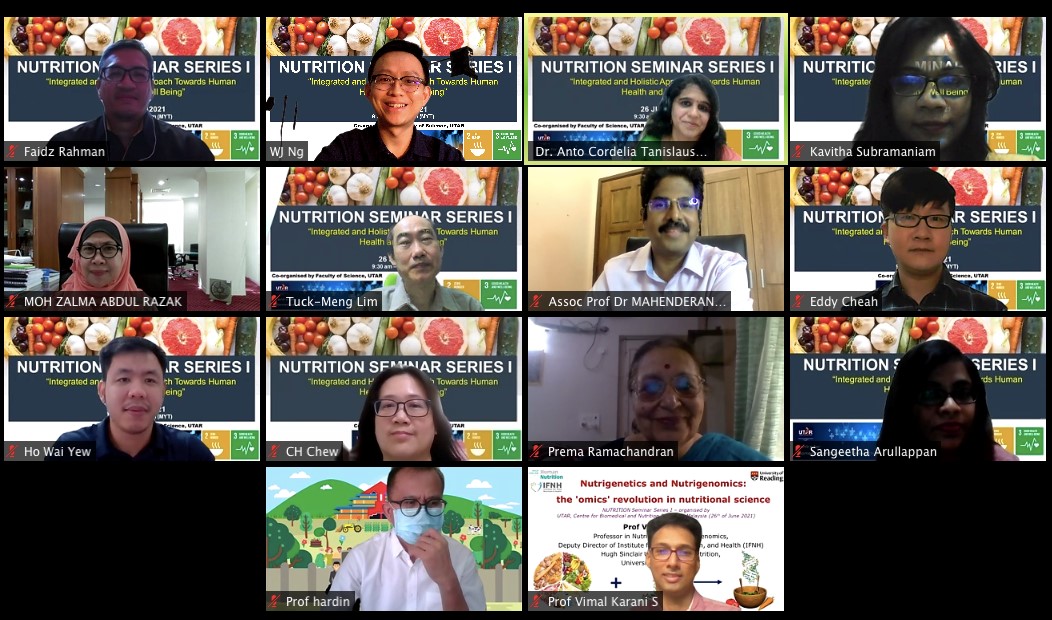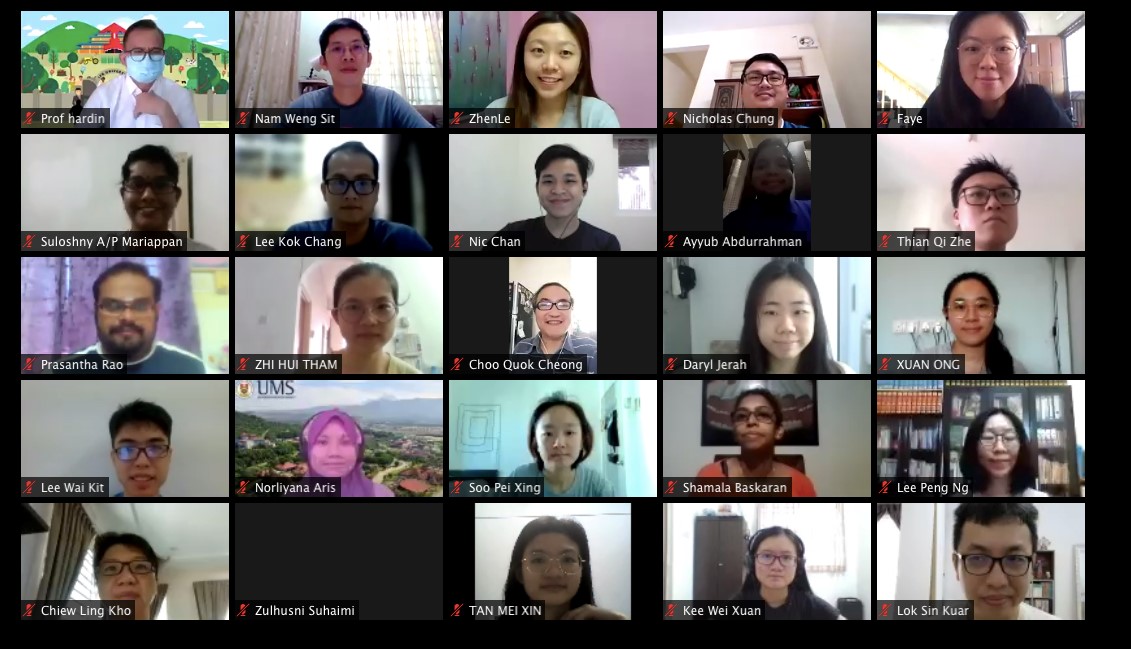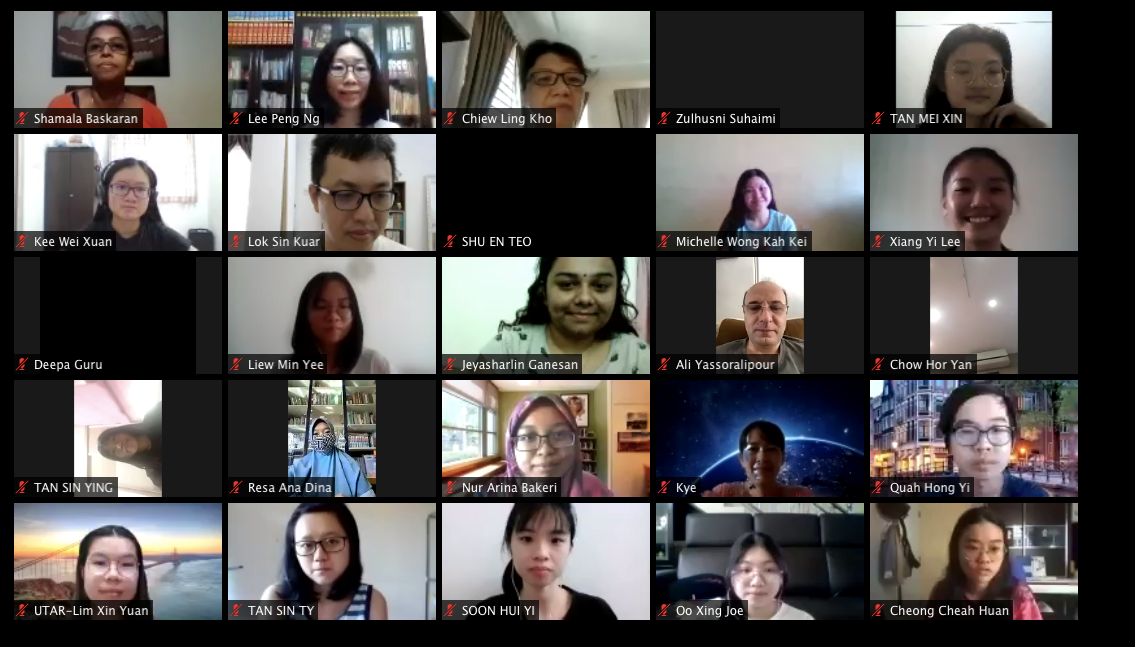
Inaugural nutrition seminar promotes health and well-being
It was a success for the inaugural Nutrition Seminar Series I, jointly organised by the Centre for Biomedical and Nutrition Research (CBNR), Faculty of Science (FSc) and Institute of Postgraduate Studies and Research (IPSR), on 26 June 2021, via ZOOM, which featured four eminent speakers from Indonesia, India, Malaysia, and United Kingdom, namely President of Federation of Asian Nutrition Societies (FANS) and President of Nutrition Society of Indonesia Prof Dr Hardinsyah MS; Director of Nutrition Foundation of India Dr Prema Ramachandran; Director of Nutrition Division, Ministry of Health (MOH) Malaysia Zalma binti Abdul Razak; and Deputy Director Institute of Food, Nutrition & Health (IFNH) and Professor of Nutrigenetics & Nutrigenomics of Department of Food & Nutritional Sciences, University of Reading, United Kingdom Prof Dr Vimal Karani S, respectively. Altogether, over 260 local and international participants from 15 different countries, including India, Myanmar, Bangladesh, Indonesia, Timur Leste, UK, Canada, Vietnam, US, Sri Lanka etc, attended the webinar.
Themed ‘Integrated and Holistic Approach towards Human Health and Well-being’, the opening of the webinar was graced with the presence of Vice President for R&D and Commercialisation Prof Ts Dr Faidz bin Abd Rahman, FSc Dean Assoc Prof Dr Lim Tuck Meng, and CBNR Chairperson Dr Eddy Cheah Seong Guan, along with the organising committee and participants.
Dr Cheah explaining the aim of the webinar
“CBNR is one of the newest research centres at the University, which was established in January 2021. Our goal is to bring together the University’s researchers with expertise across various biomedical and nutritional domains to advance R&D initiatives pertaining to improvement of human health and wellbeing. With this seminar, we hope that it will set the pace in strengthening and promoting our existing nutrition and dietetic expertise through collaborative research and knowledge sharing,” said Dr Cheah.
He added, “Malnutrition in all forms remains a global health concern. Child and maternal undernutrition are ever prevalent in poverty-stricken regions while obesity and lifestyle diseases are on an alarming rise worldwide. Though food security has improved over the years, insufficient recognition is given to some aspects of the global food systems, particularly those nutrition-related, thus fuelling soaring levels of malnutrition. Significant improvements in this area, which includes food nutrition, nutrition intervention, and nutrition education and governance, are to be investigated via targeted research and concerted efforts by various international and local organisations. Today’s webinar will focus on the roles of unhealthy diet and inadequate physical activity on the prevalence of obesity; India’s progress towards achieving the global nutrition targets; the national plan and policy for improving the nutritional status of the Malaysian population; and the prospects of nutrigenetics and nutrigenomics in personalised nutrition.”
Prof Faidz officiating the webinar
Officiating the webinar was Prof Faidz, in his speech saying, “Despite the many advances and improvements to food security and nutrition, the double burden of malnutrition, namely undernutrition and overnutrition remains one of the greatest challenges of our time. In 2020, 149 million children under the age of five were estimated to be stunted and an alarming 45% of deaths in this age group were associated with undernutrition. Maternal undernutrition, which is common in many developing countries is another cause for concern. The Covid-19 pandemic which has led to negative coping measures with detrimental effects on nutritional wellbeing further aggravates these problems. On the other hand, the global prevalence of obesity has nearly tripled over the last five decades, with a concomitant rise in life-threatening health conditions such as cardiovascular diseases, diabetes, and some types of cancer.”
He continued, “The role of nutrition in improving our health and child development is of paramount importance. The UN Decade of Action on Nutrition 2016–2025 emphasises on the opportunity for addressing all forms of malnutrition. Thus, there is an urgent need to understand the global nutrition situation and how our current food systems are steering towards unhealthy diets and the consequent malnutrition. Effective means of creating sustainable, resilient food systems for enhancing healthy diets and improving nutritional wellbeing are in dire need, especially among the marginalised groups. The potentials of alternative nutrition interventions, strategies for delivery of nutrition education, as well as commitments in nutrition governance and accountability, are also to be explored via multisectoral approaches. This seminar is also the University’s commitment towards nutrition research, and I hope, through this seminar, a platform for networking and collaborative research as part of the initiative in improving the global nutrition situation can be established.”
Dr Mahenderan moderating the webinar
Moderated by Vice President of Nutrition Society of Malaysia Assoc Prof Dr Mahenderan Appukutty, the webinar proceeded with the first topic on “Diet, Exercise, Sleeping and Fasting for a Better Life and Longevity, by Prof Hardinsyah. “Healthspan is the number of years a person remains healthy and free from diseases, or the period of life without functional limitations, chronic diseases, and disability. The optimal healthspan can potentially be achieved by preserving or improving the function abilities,” explained Prof Hardisyah.
Prof Hardinsyah highlighting the importance of DESF management
He also explained factors that affect healthspan, which included diet, fasting, happiness, sleep and lifestyle. Participants learnt that higher levels of physical activities increase the odds of healthy ageing by 39%, and numerous studies have shown that maintaining a minimum quantity and quality of exercise decreases the risk of death, prevents the development of certain cancers, lowers the risk of osteoporosis, and increases longevity. He also mentioned that recent studies have confirmed the strong effect of physical activity on cardiovascular, metabolic, musculoskeletal and mental health in this age group.
He also shared that the current review of related studies showed that autophagy plays an important role in maintaining healthier and longer life. Similarly, adequate sleep of 7 to 9 hours and having no sleep disturbances between ages 50 to 75 are said to be associated with longer, healthier, and chronic disease-free life expectancy. “Adequate sleep is recorded to offer multiple benefits, which include, full rest and less stress, support for immune function and cellular repair, protection for both neurological and cognitive processes, helps maintain cardiovascular and metabolic health, and reduction in age-disrupted circadian rhythms. “Studies showed that the healthspan could be maintained longer through diet, exercise, sleeping, and fasting (DESF) management. Different strategies required to increase healthspan by DESF, since it is believed that there are differences in variation and sensitivity among ethnics and individuals in the application of DESF for a better healthspan. Therefore, future studies to extend the application of DESF are needed. We need to integrate and send simple messages on nutrition and healthy lifestyle for a long life span,” said Prof Hardinsyah.
Dr Prema listing the targets that need to be achieved by 2025
Dr Prema, on the other hand, enlightened participants on “Sustainable Development Goal (SDG) Nutrition Target: Current Status and Future Priorities in India”. She explained SDG recognises that in the post-2015 era, under-and over-nutrition are major public health problems, and there is a need to take up programmes to combat both. “Over-nutrition is a major factor responsible for the rising prevalence of non-communicable diseases (NCDs). Nutrition intervention aimed at prevention, early detection and effective management of over-nutrition will be the major enabling factors for the prevention of rising NCDs. SDG recognises that globally, there has been a health transition. Persistent under-nutrition and micro-nutrient deficiencies continue to require scaling-up and effective implementation of the ongoing intervention,” explained Dr Prema.
She mentioned that the four global nutrition targets for reduction in under-nutrition to be achieved by 2025 are a 30% reduction in low birth weight (LBW); increase in the rate of exclusive breastfeeding (EBF) in the first six months up to at least 50%; 40% reduction in the number of under-five children who are stunted; and childhood wasting to be brought down and maintained at less than 5%. For combating over-nutrition, Dr Prema mentioned that the SDG nutrition targets to be achieved by 2025 are to prevent the rise in child over-nutrition; halt the rise in over-nutrition in adults; halt the rise in diabetes, and take into account national priorities including halt the rise in hypertension or achieve 25% reduction in the prevalence of hypertension.
For each target, Dr Prema elucidated the statistics and current results achieved in India. “In India, under-nutrition and its health consequences and poor maternal and child health indices are still public health problems. Most of these health problems are symptomatic and acute, but can be readily treated. Over-nutrition and associated NCDs are now emerging as major public health problems. Most of the NCDs are asymptomatic in the initial phase, and patients only seek care mostly when complications set in. NCD management requires lifestyle modification and lifelong medication. India’s health system has to reorient and gear itself up for successfully managing prevention, early detection, and effective management of dual nutrition and disease burden,” explained Dr Prema.
She added, “Assessment of nutritional status is an important component of both public health interventions and care of individuals seeking health care. Ideally, nutritional assessment should be carried out periodically in all individuals and more often in vulnerable segments. Therefore, assessment of nutritional status should be carried out as and when there is an opportunity, or when any person seeks health or nutrition care or as a part of community-based nutrition surveys. On this note, we also come to realise that nutritionists and physicians have to play a critical role in combating the dual nutrition and disease burden through appropriate nutrition and lifestyle counselling and nutrition and health care. Promoting synergy between health and nutrition services will enable the country to achieve rapid improvement in health and nutritional status of the population, and achieve the SDG targets for both nutrition and health.”
Zalma explaining the initiatives and actions taken by the government to combat the double burden of malnutrition
Meanwhile in Malaysia, Zalma’s “Nutrition Governance: Commitment, Capability, and Collaboration in Malaysia” sharing explained that the country is currently facing the double burden of malnutrition. She also mentioned that even though the rate of increase was lower from 2006, the global and national target to maintain the prevalence of both overweight and obesity in Malaysia is still not yet achieved. A similar trend was also observed in the prevalence of stunting among children under five years of age. These pose a big challenge to the country, especially to the Ministry of Health Malaysia. Her talk elaborated on the government’s commitment in addressing this issue through the National Nutrition Policy of Malaysia and the National Plan of Action for Nutrition of Malaysia (NPANM). Both documents outline the vision, mission and strategies towards achieving nutritional wellbeing of the people through whole-government and whole-society approaches.
“The framework of the National Nutrition Policy of Malaysia 2.0 addresses the issues and challenges on the double burden of malnutrition; food and nutrition insecurity; and the lack of multi-sectoral collaboration. The many strategies included in this framework aim to achieve nutritional well-being for a healthy nation. The success of these strategies will also yield outcomes such as elevated nutritional status; reduced diet-related NCD burden; strengthened food and nutrition security; nutrition component integrated into national policies; and more priority on nutrition agenda by stakeholders,” explained Zalma.
She also further elaborated on the implementation, monitoring and evaluation mechanism, which involves various parties ranging from the National Food Safety and Nutrition Council, National Coordinating Committee on Food and Nutrition, Food Safety Committee, Cabinet Committee on Food Security, National Action Council on Cost of Living, and Cabinet Committee on Healthy Malaysia Agenda. Activities and initiatives in combatting the double burden of malnutrition in the country, as mentioned by Zalma, include national references, collaboration with food and beverage industries, healthy eating initiatives and advocates, obesity intervention, infant and young children nutrition, and nutrition promotion through various media. She also explained that the collaborations established look towards nutritional well-being, and the parties they have collaborated with were ministries and government agencies, academia, professional bodies and non-governmental organisations (NGOs), and the food and beverage industries.
Prof Vimal explaining the use of nutrigenetics and nutrigenomics as novel tools for nutritional research
The Final speaker Prof Vimal, spoke on “Nutrigenetics and Nutrigenomics: the 'omics' Revolution in Nutritional Science”. Sharing from his research, participants learned that the ability of nutrigenetics to determine what nutrients will produce the desired impact on metabolic balance (as influenced by individual genetic make-up) is at the core of personalised nutrition. Nutrigenetics and nutrigenomics serve as novel tools for nutritional research and help in mitigating health-related problems of humans. Individuals differ from each other in their genetic makeup due to which individuals respond differently to various lifestyle factors such as diet and physical activity. These genetic differences are the key enabler of the emerging nutrigenetics and nutrigenomics areas of research. Obesity is a heritable condition that arises from the interactions between multiple genes and lifestyle factors such as unhealthy diet and physical inactivity. Dietary factors play an important role in the development of obesity because of the variation in the food that is being consumed in different parts of the world.
He also explained that nutrigenetics has highlighted the complexity of gene-diet interactions but it offers opportunities to re-evaluate criteria used to set dietary guidelines and the contribution of genetic variation to optimal nutrition for individuals from different ethnic groups. In line with this, a large-scale collaborative project called GeNuIne (Gene-Nutrient Interactions) Collaboration aims to develop personalised nutrition strategies based on the evidence from nutrigenetics, nutrigenomics and dietary intervention studies using cohorts from various ethnic groups has been initiated. In this collaborative study, gene-nutrient interactions on obesity-related traits across various ethnic populations such as India, Indonesia, Brazil, Thailand, Sri Lanka, Ghana, Turkey and the UK are being examined. If the interactions between genetic variations and nutritional requirements are better understood in various ethnic groups, dietary recommendations could be personalised according to genotype to ultimately promote health and reduce disease risk.
Ensued was an interactive Q&A session, and a closing remark by Dr Lim to mark the end of the webinar. “As a university, knowledge is generated, preserved and disseminated. Today, this webinar has provided an avenue for us to discuss nutrition and raise awareness for health and well-being. I hope the webinar has offered a better glimpse and ideas of how nutritional science can be integrated with technology for solving nutritional problems and threats,” said Dr Lim.
Dr Lim explaining the benefit of the webinar

A group screenshot of the guests, speakers, moderator and organising committee


Top and bottom photos: Participants of the webinar
![]()
![]()
© 2021 UNIVERSITI TUNKU ABDUL RAHMAN DU012(A).
Wholly owned by UTAR Education Foundation (200201010564(578227-M)) LEGAL STATEMENT TERM OF USAGE PRIVACY NOTICE